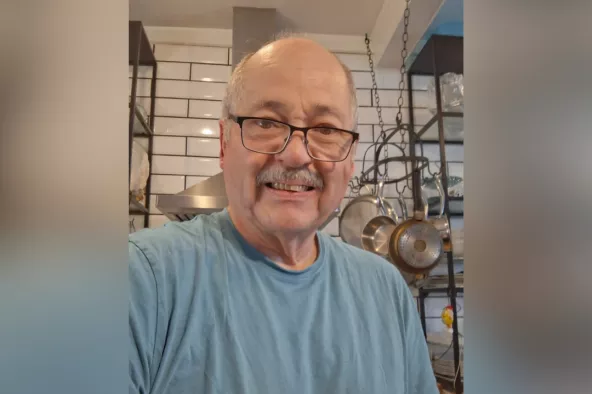Reigniting the flame: Lessons from the long road

In honour of International Overdose Awareness Day on Aug. 31, hear from Ron Merk, family partner at BCMHSUS, as he shares wisdom on resilience, community, and finding ways to keep going in the face of crisis.
Over the years, I’ve worn many hats: a father, grandfather, a community collaborator, a witness to the unthinkable, and someone who’s had to find ways to keep showing up even when the tank felt bone-dry. My journey began as a family member, watching someone I love struggle with mental health and substance use. That personal connection drew me into patient/family work with BCMHSUS and many other community initiatives, and I’ve been learning ever since.
This isn't a story of advocacy alone, though yes, I’ve written letters and stood up in meetings. This is about survival and resilience in the face of an unrelenting crisis. If you’re a nurse, doctor, care provider, a policy planner, a team lead, or simply someone who shows up to support others in this system, I’d like to share some hard-won wisdom. These are not strategies from a textbook. They’re the tools that have helped me keep going, and I hope they might help you, too.
Reorienting Through Lived Experience
First, let me name something plainly: this is hard. Now matter who you are, whether you’re working in the system, or a parent/patient sitting in a waiting room, the toll is real. We’ve all experienced a kind of slow erosion. For me, it wasn’t one big event that broke me. It was the accumulation: unanswered emails, funerals that came too soon, policy decisions made too far away from the people they affect most.
There is no quick fix. But there are ways to build sustainability. Not just in services, but in ourselves.
A Personal Toolkit for Staying in the Work
Here are nine approaches I’ve learned. Mostly the hard way, which helps keep the ember burning:
1. Reconnect With Your "Why"
Keep a photo, a story, a name. Something that reminds you why you care. When things feel abstract or bureaucratic, return to that touchstone. That’s your compass.
2. Let Stories Lead
Whether you're a nurse, doctor, service provider or systems leader, never underestimate the power of the human story. It’s easy to become numb to numbers. But real stories bring us back to our shared humanity. Share yours. Invite others to do the same. Go looking for those stories everywhere.
3. Celebrate the Small Stuff
Did someone make it to their appointment? Did your team finally get a meeting with someone higher up the chain? Did a patient smile for the first time in weeks? Name it. Claim it. These moments aren’t small, they’re fuel.
4. Don’t Go It Alone
You’re not meant to carry this alone. If you're tired, hand the mic to someone else. If you're new, ask questions. None of us is superhuman. We’re a relay team, not solo runners.
5. Shrink the Frame When Needed
When things feel broken, focus on what’s right in front of you. Help one person. Improve one thing. The ripple will come. You don’t have to fix everything all at once.
6. Rest Without Apology
This one’s tough, especially if you're used to giving more than you get. But rest is not failure. It’s strategy. Burnout doesn’t help anyone. Permission granted to pause.
7. Find Your People
Connect with others who get it. Whether it's colleagues, a community group, or a quiet chat with someone who's walked a similar road, don’t underestimate the healing power of shared experience.
8. Claim the Constructive Work
You’re not just reacting to a crisis. You’re helping build the future. One where compassion and evidence shape care. That’s worth reminding yourself of. Often.
9. Play the Long Game
Change comes in fits and starts, not in sweeping heroic moments. Think generationally. Think sustainably. Do your part, and let others do theirs. We are not meant to give everything. We are meant to contribute what we can, when we can.
What This Has Taught Me
I've learned that longevity in this work, whether personal or professional requires constant recalibration. It’s not about pushing through endlessly. It’s about pacing yourself, building community, and choosing moments of pause so you can return with intention.
We often talk about harm reduction in the context of substances, but we rarely talk about harm reduction for the people doing the work. We need it. All of us.
Closing Thoughts
You don’t need to be the loudest voice or the most visible leader. Sometimes, the most meaningful change comes from quietly showing up again and again, grounded, rested, and ready to listen.
So wherever you are in this crisis — front line, family member, administrator, peer — remember: you matter, too.
And if you’re running on empty? You’re not alone. Trust me here. The only way to find ways to refill our tanks is together. None of us can survive and walk this crisis alone.
Learn more about available support on the Government of BC website.